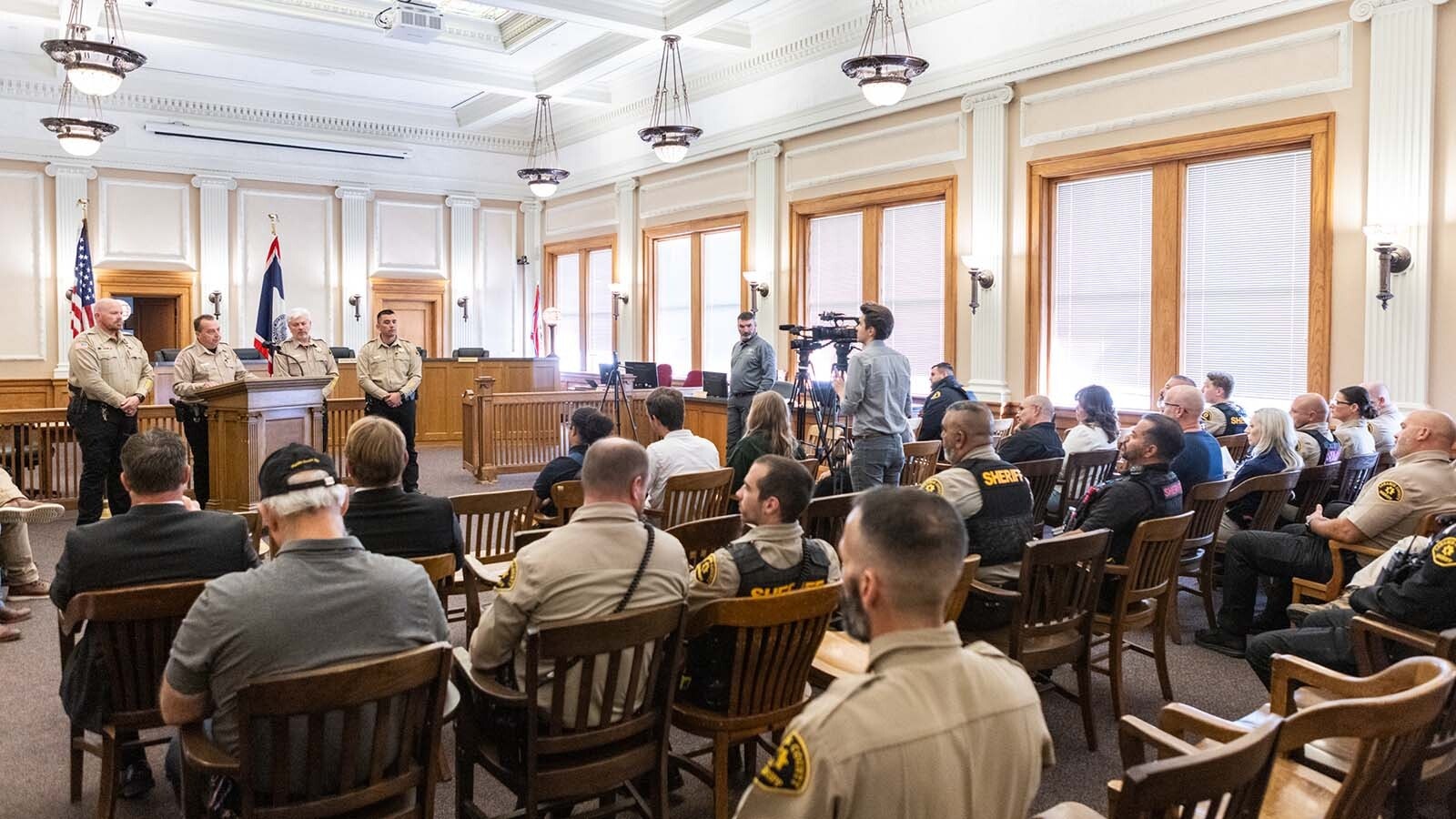CHEYENNE — More than two dozen sheriff’s deputies stood ready for immigration enforcement duties Wednesday in the Laramie County Board of Commissioners meeting room, waiting to be sworn into the new expansion of their roles.
Laramie County Sheriff Brian Kozak swore in 25 deputies to participate in the task force component of the 287(g) program, a U.S. Immigration and Custom Enforcement (ICE) agreement which allows them to work with federal authorities in enforcing immigration law, and detaining people who are in the country illegally.
The number, 25 deputies, strikes a noteworthy figure.
For example, Sweetwater County Sheriff’s office, a longstanding partner to ICE on detentions and other efforts, is authorizing up to five immigration task force officers from within its force, the sheriff’s office said in April.
Kozak himself received training and to help carry out his agency's program, he told Cowboy State Daily in a prior interview.
Kozak and others said during a Wednesday news conference that they would not be conducting immigration raids, but only focusing on illegal immigrants who have committed crimes or who have been caught doing criminal activities.
“My policy prohibits immigration sweeps,” he said. “It does not allow deputies to enter private property, such as schools, churches, homes, businesses, or farms for the sole purpose of immigration enforcement.”
There will be “zero tolerance” of racial profiling or any of those types of sweeps, he later added.
But Antonio Serrano, Wyoming’s advocacy director for the American Civil Liberties Union (ACLU), said in a Wednesday statement to Cowboy State Daily that it’s “unwise” to divert local law enforcement officers.
He said Laramie County deputies “belong in the neighborhoods of our communities providing crime prevention services to build trust and maintain order – not pulled out of neighborhoods to handle a federal responsibility.”
The Swearing-In
The 25 deputies were sworn into serving under the 287(g) agreement by Robert Guadian, Field Office Director of the U.S. Immigration and Customs Enforcement’s (ICE) Denver Enforcement and Removal Operations office.
That office serves both Wyoming and Colorado.
Kozak said the deputies were required to complete 40 hours of training, mostly on constitutional law, along with the finer investigative details of trying to validate whether someone is here legally.
Those 25 now join the ranks of Wyoming Highway Patrol officers, who started working with ICE on federal immigration enforcement in late July. The state’s National Guard is also working with ICE in a supportive role, according to an earlier statement by Gov. Mark Gordon.
Guadian told Cowboy State Daily on Wednesday that his office has a strong partnership with Wyoming state entities, and local sheriffs. They do a lot of administrative work that helps ICE, he said.
“It’s a very supportive state when it comes to immigration enforcement, because law enforcement understands what ICE brings to the table,” Guadian said. “We have the ability to disrupt criminal operations, we can take bad actors out of the community and out of the country.”
The activation of Kozak’s task force marks just one of Laramie County’s partnerships with ICE.
The office also has active agreements to launch immigration investigations pertaining to jail inmates, and to house inmates for ICE after the default 48-hour cutoff.
‘Worst Offenders’
Guadian, Kozak and Darin Smith, the U.S. Attorney for Wyoming, said that the partnership between Laramie County’s sheriff’s deputies and ICE is meant to catch the worst offenders who are making communities unsafe.
“We’re not looking to profile anyone, we’re looking to enforce the laws we have,” Smith told reporters Wednesday.
Kozak said all his deputies wear body-worn cameras, and the office routinely reviews video captured from those cameras. Supervisors within the office are required to review footage when activities under the 287(g) agreement happen, to ensure profiling does not take place, he added.
The focus, he said, is that if deputies encounter someone doing a criminal act, the secondary act would be to see if they are in the country illegally.
One of the big issues in Laramie County and throughout the state is human and sex trafficking, the sheriff said. The 287(g) agreement allows victims who are in the country illegally to be issued temporary visas, so they can testify in court against the criminals responsible for that trafficking.
Guadian said because of Wyoming’s size and sparse population, he has to be strategic in whom he targets when conducting investigations.
“I have to be smart about who I go after, if I’m going to expend resources and a team to go after someone, they’re going to be high-value targets, typically people that no one wants in their communities,” Guadian said.

ACLU Criticizes Decision
Despite several law enforcement’s assurances, ALCU’s Wyoming cast warnings about Wednesday’s swearing-in. Serrano said the 287(g) agreement makes it harder for law enforcement to do their jobs, especially since a substantial number of deputies – more than two dozen – are now authorized for ICE tasks.
The agreement also requires local law enforcement to make judgements about complex parts of federal law, which often rely on racial profiling, Serrano said.
“By participating in 287(g) agreements, the Laramie County Sheriff’s Office is actually eroding trust in local law enforcement and deterring immigrant families from coming forward when they are the victims of crime or even asking for basic assistance,” he said.
Kozak, however, told reporters that several of his deputies are bilingual, and that his office is constantly reaching out to communities with immigrants. Many of those people come from countries where there is little to no trust of law enforcement, so bridging those gaps is an ongoing process, he added.
Guadian echoed the sheriff’s comments Wednesday.
“A lot of the immigrant communities, they don’t want illegal aliens in their communities either, because they’re the ones that are victimized,” he said in an interview. “[Illegal aliens] aren’t victimizing people that are living in high-end neighborhoods, they’re victimizing the same immigrant communities that these people come from.”










